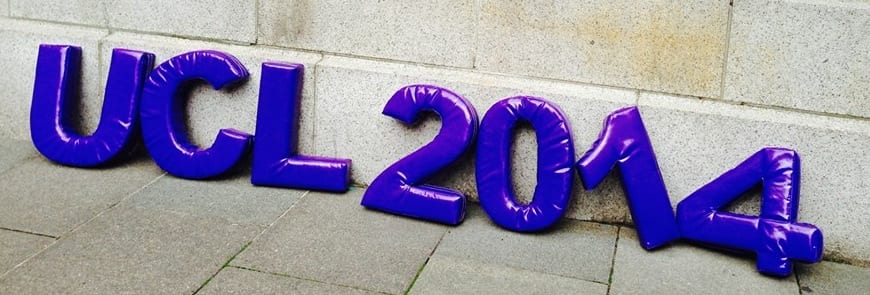My First Week at UCL by Becky Scott
By Anne Welsh, on 26 September 2014
New beginnings are always a little daunting. Arriving at one of the world’s best universities to study at Masters level can make you feel more than a little awed by the task. When you add to that the fact that I haven’t studied in this way for ten years, you can imagine my nervousness as I waited in line to enrol in our department on the first day. But as I look back the end of Induction Week, I feel that anything is possible over the coming year.
My course tutors have both challenged me and supported me. Those first day nerves are gone now. I am already submerged in the language of Library and Information Studies. Reflecting on the Professional Knowledge and Skills Base, I know my strengths as well as the areas which I need to develop. Charlie has asked us simply “to read and to think” and as Librarians these are two things that are second nature to us. We love learning. We love helping others to learn. Reading and thinking are achievable tasks.
Of course I had fears that I wouldn’t fit in. We come from a diverse range of disciplines and, as Anne said, a range of different ‘cultural backgrounds’. But as each day passed, we got to know one and other and I have realised that we are all kind, welcoming and willing to help each other. Certainly, using the exercise to “find someone who…” stopped me being intimidated and helped me start conversations on Librarianship but many other topics too.
My classmates have guided me across campus to lecture theatres, helped me register with Senate House Library and even find the cash machine. They have made this week enjoyable and entertaining. Every day, I discover that I love studying at a London university. There are so many treasures to discover: museums, farmers’ markets and of course, libraries. Visiting the Royal Astronomical Society Library was a wonderful opportunity to explore a special collection but also to learn from the day to day challenges of an experienced practitioner.
In just five days, I have gone from fearing the dissertation to being open to all ideas which may be sparked in my seminars. I felt inspired by Henry and Fiona – two recent Department of Information Studies graduates – who shared their experiences of writing the dissertation and how they shaped their ideas.
I write this as just one voice in the LIS class of 2014/2015 but we are all on our UCL learning journey. New beginnings may be a little daunting but they are also simulating, thought-provoking and full of potential.
—–
Becky Scott (@the_bookette) is working as a school librarian while studying for her MA LIS.
Image: Dr Susan Greenberg. All rights reserved. Used with permission.
Note: the appearance of the byline on this post is auto-generated, indicating that it was posted by Anne Welsh. Becky Scott is the sole author of this piece, with the image provided by Susan Greenberg.
 Close
Close





